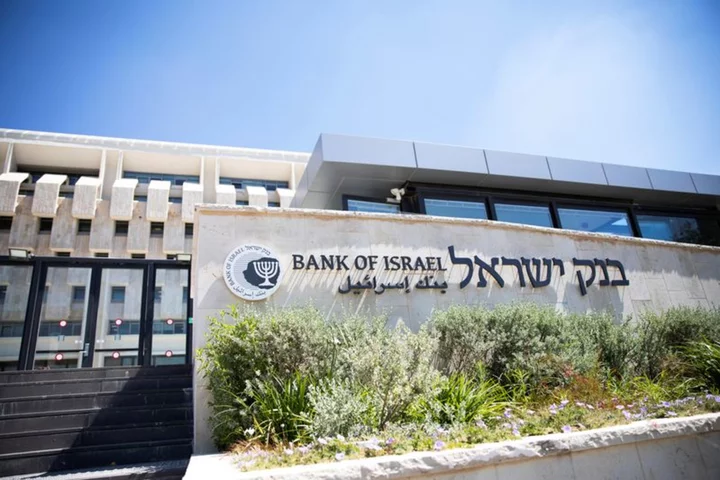By Steven Scheer
JERUSALEM Israel's central bank is expected to leave short-term interest rates unchanged next week for a fourth straight meeting to maintain financial stability and avert an uptick in inflation due to the war with Hamas, which has raised supply concerns.
All 14 economists polled by Reuters projected the Bank of Israel would hold its benchmark rate at 4.75% - its highest level since late 2006 - when it announces its decision on Monday at 4 p.m. (1400 GMT).
The central bank raised the rate 10 times in a row from 0.1% in April 2022 before pausing in July and again in August and October.
"As the war is going on, they will not lower rates because they will be afraid of the inflationary pressure that can be driven by the war," said Ori Greenfeld, chief economist at the Psagot brokerage. "So they will keep it at 4.75% and will decide only after the war where are we going (with rates)."
The subsequent policy meeting is set for Jan. 1, 2024 and economists believe that should inflation - now at 3.7% annually - show signs of abating, interest rates could start to decline at that time though much still depends on the impact of the war.
While growth is set to slow due to a grim national mood and hundreds of thousands of Israelis called into military reserve duty, there is a severe shortage of foreign workers - Palestinians and Thais - in the construction and agriculture sector, and this could limit supply and lead to a spike in prices when demand returns, economists say.
Israel launched its war in Gaza after gunmen from Hamas burst across the border fence, killing 1,200 people and seizing about 240 hostages, according to Israeli tallies. Since then, over 14,000 Gazans have been killed by Israeli bombardment, around 40% of them children, according to health authorities in the Hamas-ruled territory.
A four-day temporary truce accord during which some Israeli hostages in Gaza would be freed was announced on Wednesday morning, but Israel said implementation of the deal would be delayed at least until Friday.
When the war began, the already battered shekel had weakened another 6% in 2023 and raised central bank fears of higher inflation, spurring Governor Amir Yaron to suggest that the bank would likely hold off on rate cuts during the war to preserve market stability despite a hit to economic growth.
He said measures taken by the central bank acted like monetary easing, such as working with lenders to allow those impacted by the conflict to defer or freeze loan repayments.
So far in November, the shekel has reversed course - aided by a dive in the dollar - and has gained 8% versus the greenback to more than pre-war levels.
As such, Morgan Stanley economist Georgi Deyanov gave a 40% chance of a rate cut of 25-50 basis points next week, but said he believed the central bank "will remain cautious in consideration of ongoing uncertainty about the future path of the conflict, despite the prospects of a temporary ceasefire".
Yaron, who is slated to give a news conference on Monday at 4:15 p.m. (1415 GMT), this week accepted a second five-year termthat removed an element of market uncertainty this year.
(Reporting by Steven Scheer; editing by Mark Heinrich)

